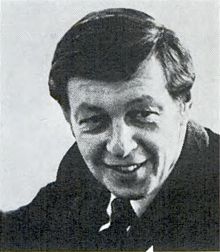This is an old revision of this page, as edited by 68.194.91.23 (talk) at 22:16, 25 January 2017. The present address (URL) is a permanent link to this revision, which may differ significantly from the current revision.
Revision as of 22:16, 25 January 2017 by 68.194.91.23 (talk)(diff) ← Previous revision | Latest revision (diff) | Newer revision → (diff)| Frederick William Richmond | |
|---|---|
 | |
| Member of the U.S. House of Representatives from New York's 14th district | |
| In office January 3, 1975 – August 25, 1982 | |
| Preceded by | John J. Rooney |
| Succeeded by | Guy V. Molinari |
| Personal details | |
| Born | (1923-11-15) November 15, 1923 (age 101) Boston, Massachusetts |
| Political party | Democratic |
| Alma mater | Boston University |
Frederick William Richmond (born November 15, 1923) is a former Democratic member of the United States House of Representatives from New York.
Biography
Richmond was born in Boston, Massachusetts. He served in the United States Navy from 1943 until 1945. Richmond graduated from Boston University in 1945. He engaged in a wide array of civic and charitable activities in New York. In college, he supported himself by playing the piano and forming the Freddie Richmond Swing Band. He served as deputy finance chairman of the Democratic National Committee from 1958 until 1960. Richmond was a delegate to the 1964 Democratic National Convention. He was a member of the New York City Council from 1973 until 1974.
Richmond was elected to Congress in 1974 and represented New York's 14th congressional district from January 3, 1975, until August 25, 1982. In spite of his Northern, big city upbringing, upon his election, Richmond joined the House Agriculture Committee where he spent many years lobbying campaigns to develop new support for federally funded inner city gardens which he hoped would spread across the nation. Due to his work, and with help from House veterans in congress like Jamie Whitten, the Urban Gardening Program (UGP) was created .
From the 1950s to the 1980s he built a conglomerate, incorporated in 1960 as Walco National, buying up and usually improving the operations of a diverse group of smaller operating companies. His business career was not without notoriety. Richmond was also known as an opportunist who skirted the ethics. In one instance, he was accused of involvement in greenmail, the purchase of strategic blocks of shares for resale back to a target for a profit.
In 1982 Richmond was convicted on federal corruption charges, which included possession of marijuana and payment of an illegal gratuity to a Brooklyn Navy Yard employee. As part of a plea bargain he was forced to resign from office. This was not Richmond's first brush with the law. Despite the seriousness of this crime Richmond referred to it as "an isolated incident" in his next re-election campaign. Soon after he was returned to Congress by a large majority of his constituents.
With a personal fortune estimated at $32 million, Richmond was one of the wealthiest members of Congress.
As of 2010 he was a resident of New York City.
References
- Malakoff, David (1994). "Final Harvest". Community Greening Review: 1–2.
{{cite journal}}:|access-date=requires|url=(help)
External links
- United States Congress. "Fred Richmond (id: R000232)". Biographical Directory of the United States Congress. Retrieved on 2009-05-19.
- "What's Really Wrong with Fred Richmond?", Jim Sleeper, Village Voice, March 30, 1982.
- "The Rise and Fall of Fred Richmond", Pete Hamill and Denis Hamill, The New Yorker, November 22, 1982.
| Political offices | ||
|---|---|---|
| Preceded byLeonard Scholnick | New York City Council, 18th District 1973 |
Succeeded byMorton Povman |
| Preceded byMario Merola | New York City Council, 29th District 1974 |
Succeeded byAbraham Gerges |
| U.S. House of Representatives | ||
| Preceded byJohn J. Rooney | Member of the U.S. House of Representatives from New York's 14th congressional district 1975–1982 |
Succeeded byGuy V. Molinari |
- 1923 births
- Living people
- American businesspeople convicted of crimes
- American naval personnel of World War II
- American people convicted of drug offenses
- American people convicted of tax crimes
- American politicians convicted of bribery
- Boston University alumni
- Jewish members of the United States House of Representatives
- Members of the United States House of Representatives from New York
- New York City Council members
- New York Democrats
- New York politicians convicted of crimes
- Politicians from Boston
- Democratic Party members of the United States House of Representatives
- 20th-century American politicians